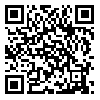دوره 4، شماره 4 - ( 9-1396 )
جلد 4 شماره 4 صفحات 53-47 |
برگشت به فهرست نسخه ها
Download citation:
BibTeX | RIS | EndNote | Medlars | ProCite | Reference Manager | RefWorks
Send citation to:



BibTeX | RIS | EndNote | Medlars | ProCite | Reference Manager | RefWorks
Send citation to:
Maredpour A. The Relationship between Religiosity and Mental Health in High School Students Using the Mediating Role of Social Support. Health Spiritual Med Ethics 2017; 4 (4) :47-53
URL: http://jhsme.muq.ac.ir/article-1-156-fa.html
URL: http://jhsme.muq.ac.ir/article-1-156-fa.html
The Relationship between Religiosity and Mental Health in High School Students Using the Mediating Role of Social Support. Health, Spirituality and Medical Ethics. 1396; 4 (4) :47-53
چکیده: (5290 مشاهده)
Background and Objectives: The influence of religiosity on students’ perceived social support, in addition to the role these two variables play in mental health are of utmost importance. The aim of this study was to investigate the relationship between religiosity and mental health in high school students in Yasooj using the mediating role of social support.
Methods: The present descriptive-correlational study was conducted on 201 high school students in Yasooj in 2016. Samples were selected by multistage cluster sampling. To collect data, Glock and Stark's Religiosity Scale, 28-item General Health Questionnaire, and Multidimensional Scale of Perceived Social Support were used. Data analysis was conducted using Pearson’s correlation coefficient and multivariate regression analysis.
Results: Regression analysis showed that religiosity significantly predicted social support from family (β=0.25, p<0.01) and significant other (β =0.21, p<0.01). Social support from family (β = -0.26, p<0.01) and significant other (β =-0.25, p<0.01) could significantly predict students’ mental health, and also religion (β =-0.28, p<0.01) could significantly predict students’ mental health. Findings showed that social support from family and significant other were partial mediators of the association between religiosity and mental health.
Conclusion: The results showed that religiosity, both directly and indirectly, enhanced students' mental health through social support from family and significant other. It is therefore essential for the policy makers in the field of mental health and education to focus on religious beliefs.
Methods: The present descriptive-correlational study was conducted on 201 high school students in Yasooj in 2016. Samples were selected by multistage cluster sampling. To collect data, Glock and Stark's Religiosity Scale, 28-item General Health Questionnaire, and Multidimensional Scale of Perceived Social Support were used. Data analysis was conducted using Pearson’s correlation coefficient and multivariate regression analysis.
Results: Regression analysis showed that religiosity significantly predicted social support from family (β=0.25, p<0.01) and significant other (β =0.21, p<0.01). Social support from family (β = -0.26, p<0.01) and significant other (β =-0.25, p<0.01) could significantly predict students’ mental health, and also religion (β =-0.28, p<0.01) could significantly predict students’ mental health. Findings showed that social support from family and significant other were partial mediators of the association between religiosity and mental health.
Conclusion: The results showed that religiosity, both directly and indirectly, enhanced students' mental health through social support from family and significant other. It is therefore essential for the policy makers in the field of mental health and education to focus on religious beliefs.
| بازنشر اطلاعات | |
 |
این مقاله تحت شرایط Creative Commons Attribution-NonCommercial 4.0 International License قابل بازنشر است. |




